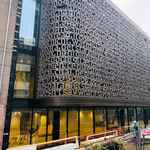Vossius Seminar 4 June
- Date
- 4 June 2024
- Time
- 15:30 -17:30
- Location
- University Library
- Room
- Vondelzaal
Josephine Hoegaerts (UvA)
“On becoming dysfluent. Stammering, Suffering and Complaint in the 19th century”
The 19th century saw the publication of an impressive range of guides, handbooks, and cures for stammerers. Coinciding with the development of the ideology of ‘self help’ as well as the formation of numerous speech-related disciplines like laryngoscopy, phoniatry and speech therapy, these publications contributed to the construction of stammering as a source of particular (often middle class, often male) suffering. And where people suffer, they complain.
In this talk, I explore the possibilities of combining a history of the scientific and therapeutic innovations regarding stammering with an approach that takes dysfluent complaint seriously as an articulation of the self in pain. In order to do so, I will argue, we need to draw on a range of different sources … and we might need to become a bit dysfluent ourselves.
Josephine Hoegaerts is Professor of European Culture after 1800 at the University of Amsterdam. Her research focuses on the history of vocal performances of health, politics and class in the long nineteenth century. Recent publications include “Fairness and fluency: the political audibility of ‘newcomers’ in Victorian debating clubs and public meetings, 1870–1910”. Parliaments Estates & Representation (2024) and “Vocal recognition before recording: techniques of vocal documentation, classification and identification in the long nineteenth century” Sound Studies, 9(2) (2023), 166-186.
Frans van Lunteren (VU, Universiteit Leiden)
“Mono-, inter- and transdisciplinarity: some historical reflections”
Disciplines are under increasing pressure. They have been accused of creating problematic siloes for knowledge, unfit to solve real world problems. The inevitable response to this growing insight was the post-war rise of interdisciplinarity and, much more recently, that of transdisciplinarity. If interdisciplinarity aimed to transcend the rigid disciplinary boundaries, then transdisciplinarity also blurred the boundaries between science and society, by focusing on complex social problems and by promoting stakeholder participation. However, this popular narrative of a natural three stage process is far too simplistic, as I hope to show by taking a closer look at the emergence of each of these three ways of organizing the production of knowledge.
Frans van Lunteren is professor of history of science at the Vrije Universiteit Amsterdam and holds the Teylers chair in the same subject at the University of Leiden. His research interests include modern discipline formation, international collaboration, the laboratory, metrology, meteorology and physics, and the concept of the “laws of nature”. He obtained his PhD at Utrecht University on theories of gravity in the 18th and 19th centuries in 1991, where he also began his teaching career. He has been a leading figure of the field in the Netherlands for many years now.
